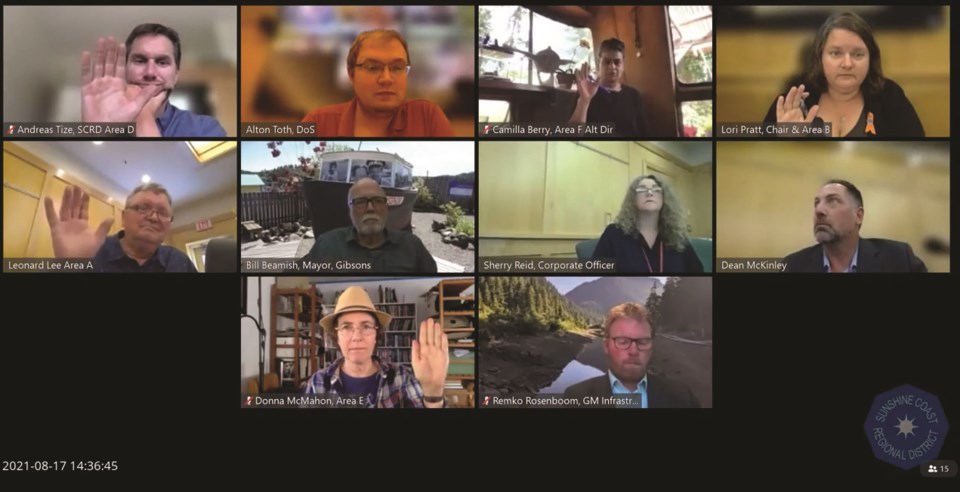At an emergency meeting called by the Sunshine Coast Regional District (SCRD) on Aug. 17, only one director voted in favour of implementing a temporary moratorium on new water service connections in the regional water service.
“Without new sources of water being ultimately authorized by the provincial government, the SCRD cannot in good conscience continue to accept increased demand on our strained water system,” part of the defeated motion read.
The rest of the voting directors – including Area F alternative director Camilla Berry, who sat in for Mark Hiltz – defeated Sechelt director Alton Toth’s motion, opting instead to send a letter to the province. The Town of Gibsons was not eligible to vote and Sechelt director Darnelda Siegers was not present at the meeting.
Water licence
Toth had suggested the temporary moratorium be in place from Sept. 14 until the provincial government issues a water licence for the Church Road well field.
The idea of a moratorium was raised by Toth the day before, at a special meeting on Aug. 16. The motion said the SCRD, “recognizing the pressures that climate change and recent growth have had on our regional water supply and the delays from the provincial government in issuing a water licence for the Church Road well field, implement a temporary moratorium on new water service connections in the Regional Water Service as serviced primarily by Chapman Creek effective September 14, 2021.”
It also called for a letter to Rural Development Minister Katrine Conroy outlining the water crisis and concerns on the Sunshine Coast.
At the Aug. 17 meeting, Toth said, “My intention with this motion is to increase public pressure on the province to issue our Church Road well licence. We’re in a crisis situation – we’re only several weeks away from being in an emergency situation. We either need more water or we need to be able to stop issuing building permits.”
Staff did not recommend implementing a moratorium on new development. Local governments do not have specific authority to create a blanket moratorium for development approvals, a 2019 staff report said.
For subdivisions, it might be possible to refuse an application with a carefully worded response on the grounds of cost to local government or contrary to the public interest – but the refusal could be challenged, chief administrative officer Dean McKinley told the board.
Staff would have to do a lot of research to develop such measures and it would have limited applicability, he added.
Some jurisdictions in B.C. have tied development permit approval to water supply.
McKinley also spoke of the efficiency of repairing leaks.
Last week, four leaks on unmetered properties in the Sechelt area were repaired after it was discovered they lost a total of 345,000 litres of water per day.
That amount could have been used by 188 homes, he said, equivalent to about $225 million of development.
“It just drove home how valuable leak detection and leak mitigation is as a water conservation tool,” McKinley said.
Drastic measure
While Elphinstone director Donna McMahon said Sunshine Coast residents ask all the time why new developments continue to be approved when there’s an inadequate water supply, she described the idea as a “drastic” and “stopgap measure” which she could not support since the public had not been consulted.
A moratorium would also not address development permits that have already been approved, Area A director Leonard Lee pointed out.
SCRD board chair Lori Pratt said, “It incurs a significant amount of risk legally and potentially financially as well for our organization and our community.”
The SCRD will be sending a letter to the province that will outline several items: that the Church Road well field licence was promised expediency by the previous minister in 2019 due to health and safety concerns; that climate change has challenged the reliability of Chapman and Edwards lakes and the environmental flow needs (for salmon); and “conservation alone is insufficient to meet the demands of our growing community.”
Directors also voted to add to the letter that they will be considering further conservation measures, including a moratorium on new connections to the water system.




